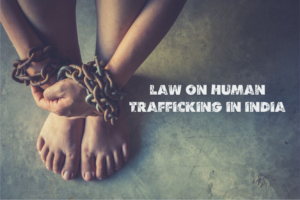
The impact of human trafficking and forced labour on human rights in India including issues related to the Rehabilitation and Reintegration of victims

Human trafficking and forced labour are grave violations of human rights that continue to plague India, despite various efforts to combat them.
These practices have a significant impact on the lives of countless individuals, particularly women and children, who are often lured into these situations under false pretences. This article will examine the impact of human trafficking and forced labour on human rights in India, including issues related to the rehabilitation and reintegration of victims.
Human trafficking is the illegal trade of human beings for exploitation or other purposes such as forced labour or sexual exploitation. The practice of human trafficking is a serious violation of human rights and has a severe impact on its victims.

According to the Global Slavery Index, an estimated 8 million people are living in modern slavery in India. This is the highest number in the world, accounting for more than one-third of the global total. The majority of these victims are forced to work in industries such as agriculture, domestic work, and construction.
The impact of human trafficking and forced labour on the human rights of victims is devastating. Victims are often subjected to physical and psychological abuse, forced to work in dangerous and degrading conditions, and denied their basic human rights.

Many victims are also subjected to sexual exploitation, and children are often forced into child labour. These practices violate a wide range of human rights, including the right to life, liberty, and security, the right to work, the right to education, and the right to be free from torture and slavery.
Rehabilitation and reintegration of victims is a critical issue in combating human trafficking and forced labour in India. Many victims require specialized services and support to overcome the trauma they have experienced and to rebuild their lives. Unfortunately, the current rehabilitation and reintegration services available in India are inadequate and fail to meet the needs of many victims.
One of the main challenges in providing rehabilitation and reintegration services to victims is the lack of adequate funding and resources. Many organizations that work with victims of human trafficking and forced labour struggle to secure funding to provide essential services such as counselling, healthcare, and education. This lack of funding also affects the quality of services, making it difficult to provide victims with the support they need to recover and rebuild their lives.

Another challenge is the stigma and discrimination faced by victims of human trafficking and forced labour. Many victims face discrimination and social exclusion due to their status as survivors of these crimes. This can make it difficult for them to reintegrate into their communities and impact their ability to access essential services such as healthcare and education.
There are also legal challenges to providing rehabilitation and reintegration services to victims. For example, many victims of human trafficking and forced labour are not recognised as victims under Indian law, which can make it difficult for them to access essential services and support. There is also a lack of specialized courts and legal frameworks to support victims and hold traffickers accountable for their crimes.
Despite these challenges, organizations are working to provide rehabilitation and reintegration services to victims of human trafficking and forced labour in India. Many of these organizations focus on providing vocational training and education to help victims gain the skills and knowledge they need to find employment and rebuild their lives. Others provide counselling and healthcare services to help victims overcome the trauma they have experienced.
Analysis –
Human trafficking and forced labour are serious violations of human rights that have a significant impact on the lives of countless individuals in India. The lack of adequate rehabilitation and reintegration services further compounds the harm suffered by victims of these crimes.
To address these issues, it is essential to increase funding and resources for rehabilitation and reintegration services, tackle the stigma and discrimination faced by victims, and establish legal frameworks to hold traffickers accountable for their crimes. Only by working together can we hope to put an end to these practices and ensure that victims receive the support they need to recover and rebuild.







